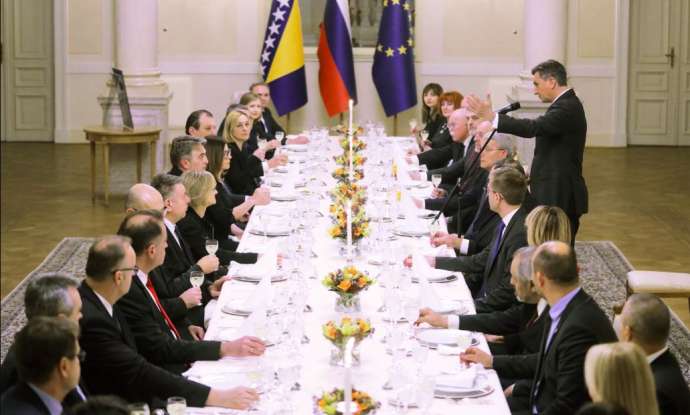STA, 4 December 2019 - The migration crisis, security issues, the European integration prospects of the Western Balkans and nuclear waste management issues were discussed as President Borut Pahor hosted the presidency of Bosnia-Herzegovina as it started a two-day official visit to Slovenia on Wednesday.
After the official talks, a press conference in Ljubljana was held by Pahor and Presidency Chairman Željko Komšić, with the former noting that all three members of the presidency had visited for a second time, which Slovenia appreciated.
Pahor said that Slovenia was inclined with favour to Bosnia-Herzegovina and respected its results despite the numerous challenges it faced, adding that Slovenia had always been inclined to EU enlargement to the Western Balkans.
"As the enlargement process could lose its momentum, this region must respond wisely," he said, endorsing the regional trade cooperation initiative, sometimes called a "mini Schengen", which he sees as a tool for the region to become attractive once more to the EU, to "become a magnet".
Pahor did not forget to mention that trade between Slovenia and Bosnia-Herzegovina is constantly rising, reaching EUR 1.4 billion last year, and that more than 100 Slovenian companies in the country employ 15,000 people.
"This means that Slovenia enjoys trust in Bosnia-Herzegovina, and we want these relations to further improve."
Komšić said that he was glad that his country had a friend in Slovenia which understood what was going on in the country, adding that he was happy that Pahor supported the "mini Schengen" initiative as every cooperation was welcome.
He said that it had been stressed that the initiative was not a substitute or alternative to the EU accession of Bosnia-Herzegovina and the entire region, but a "recommendation to the European Commission" that the region was able to cooperate.
Komšić, who represents the Croatian ethnicity in the three-member presidency, said that there were some worrying topics though, including migrations, with thousands of west-bound migrants being stuck there.
He said that a joint effort should be made towards EU institutions to solve the problem at the source, adding that the current efforts were only a reaction. "The problem should be solved at the entry to Europe, in accordance with international conventions."
The issue was also discussed by Milorad Dodik, the Serb representative on the presidency, who noted at the press conference that the borders of the EU were being shut down and that migrants could remain stuck in Bosnia-Herzegovina and "cause problems".
"A difficult humanitarian crisis may erupt," said the former PM of Republika Srpska, "adding that "the EU is trying to donate money and steer policies, but we don't need money for migrants and we don't need migrants either".
A related issued was raised, as reporters asked the presidency about the plan to bring back 24 Bosnian citizens related to the former ISIS fighters in Syria, with Komšić noting that these were women and children returning to their families.
He said that "checks have been made" and that the procedure had been carried out in cooperation with partner security agencies so the "things are being kept under complete control".
Pahor said that he was happy with the agreement that security agencies exchange all information in order to prevent incidents which could trigger fear among citizens.
As Slovenia and Croatia are discussing where to deposit nuclear waste from the jointly-owned NEK power station in Krško, the presidency raised some issues with Croatia's plan to build its rad-waste repository near the border with Bosnia-Herzegovina.
Dodik said that "depositing nuclear waste at this location is unacceptable for us and we will continue with activities to this cause", adding that Croatia needed to understand the position of Bosnia regarding waste from Krško.
Presidency member Šefik Džaferović also addressed the press, saying that the most important question was what stance the new European Commission would take following North Macedonia and Albania failing to make progress in EU accession.
Džaferović said that the rejection should be emphasised as a serious issue. "This decision has surprised us but it hasn't discouraged us, as we want our European prospects to gain significant momentum.
"We need friends who will help us in this process, including within the EU, and Slovenia is our great friend," added the Bosniak representative in the Bosnia-Herzegovina presidency.
The presidency was also hosted by parliamentary Speaker Dejan Židan, with the main topic being the EU accession prospects of the Western Balkans, with the trio saying that their country's integration in the EU was the only option.
Komšić, Dodik and Džaferović also expressed the hope that the good cooperation at the parliamentary level would continue with the new term of the Parliamentary Assembly of Bosnia-Herzegovina and that a Slovenian-Bosnian friendship group would be established soon.






